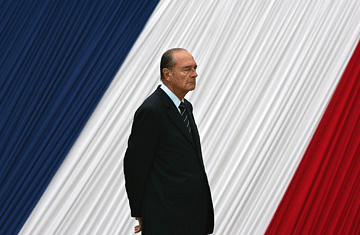
Former French President Jacques Chirac
For much of his 12-years in office, former French President Jacques Chirac successfully brushed off press allegations and legal inquiries into suspected corruption during his earlier reign as mayor of Paris by citing constitutional immunity. Now six months out of the Elysée, and its executive protection, Chirac finds himself the target of an embezzlement investigation that may wind up going to trial, with him as the key defendant.
Following three and a half hours of questioning by investigating magistrates in Paris Wednesday, Chirac was formally placed under investigation in the case — a step in the French legal procedure tantamount to being named as a suspect and charged under other justice systems. The case arose from Chirac's 18-year reign as mayor of Paris prior to his presidential win in 1995. Along with several concurrent investigations still underway involving Chirac, the suspected embezzlement of municipal funds was allegedly part of a wider system to finance Chirac's political party, and provide salaries and services to party officials on the city's tab. The case in which Chirac was officially placed under investigation Wednesday involves the recruitment of people to fill vague "project leader" positions for City Hall — positions, justice officials allege, that often involved minimal job duties.
Anticipating his official designation in the case, Chirac arranged for an open letter to be published in Wednesday afternoon's Le Monde, in which he recalls authorizing the recruitment of project leaders for the city. Rejecting the suggestion he did anything improper, Chirac wrote that the positions were, "as legitimate as they were necessary," and duly approved by the City Council. In the letter, he details the workings of that hiring campaign in an attempt to dispel any notions of wrong-doing, to try to correct what he terms the "inexact, often caricatured, at times outrageous things that have been said on this matter."
This case is one of a number of ongoing inquiries into allegedly illegal party financing during his tenure as mayor. The purported scams involved kickback schemes, bogus job arrangements, and even a spectacular 2000 video confession by a conservative fund-raiser who, before he died, recounted the illegal means by which cash was generated, and recalled delivering a suitcase full of slush money in Chirac's presence. Chirac has denied all such allegations as "lies, calumny, and manipulation," and dismissed the posthumous video confession as "abracadabrantesque."
Most of the purported machinations were rooted in a period in the early- to mid-1990s, when successive laws were passed (and blanket amnesties accorded) in an effort to sanitize the then notoriously corruption-prone French party financing systems. No suggestion has been made that any potentially misused municipal funds benefited Chirac or other City Hall officials personally.
That may not seem like a significant distinction, but political analyst Dominique Moïsi says that absence of personal enrichment is important to a French public that might, if matters proceed, "see a difference between corruption for personal gain, and breaking rules on party financing."
Moïsi also thinks Chirac's current and possibly future designation as a suspect in other cases will do harm to his reputation, but he doubts Chirac risks becoming the first French president to ever be convicted by one of the nation's courts. "There will be some sort of blame or fault assigned, but it probably won't go to conviction," Moïsi predicts. "The French already knew the details in these cases, and fully expected Chirac would be implicated by judges for them. So this is really a non-event: a matter of French justice following its course. Right now, people in France are far more focused on the strikes and their outcome than they are Jacques Chirac's legal woes."
